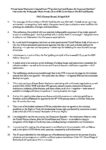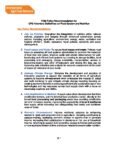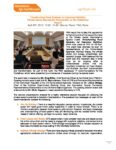Transforming Food Systems for Improved Nutrition Report
The Private Sector Mechanism would like to take this opportunity to highlight some of the key points made at the Private Sector Mechanism’s Special Event, Transforming Food Systems for Improved Nutrition, which took place at FAO on 26 April. This event was attended by over 75 representatives of the Rome-Based Agencies, Member States, the private sector, civil society, philanthropy, and research groups. PSM believes that the event was one important step in what must be an ongoing effort to collaboratively ensure that the Voluntary Guidelines on Food System and Nutrition are both implementable and transformative. As part of this work, the PSM developed 17 recommendations for the Guidelines, which were presented by a diverse set of speakers during the special event.
The event was moderated by Mr. Greg Miller, Chief Science Officer at the Global Dairy Platform. Opening remarks were made by H.E. Mario Arvelo, Chair of CFS and Permanent Representative of the Dominican Republic to the UN Rome-based Agencies, followed by Dr. Liliane Ortega, Chair of the Nutrition Open Ended Working Group and Counsellor, Deputy Permanent Representative of Switzerland to the UN Rome-based Agencies. The opening session ended with a few words by Mr. Chris Hegadorn, newly appointed Secretary to CFS.
The concise presentations enabled for a highly interactive session focused on unlocking the private sector’s potential to transform food systems. The speakers’ key messages on each of the recommendations covered the following:
- Join Up Policies: There is a need for integration across sectors. In particular, the private sector will need government policy leadership in order to move forward. There is an intrinsic relationship between food systems and nutrition.
- Food Losses and Waste: CFS stakeholders must consider food loss and waste across the entire value chain and be ready to engage with suppliers, retailers, and consumers to advocate for food system reform. PSM strongly encourages CFS to include reduction of food loss and waste in the Voluntary Guidelines.
- Address Climate Change: There are many ways to initiate a transition towards innovative agricultural practices and to become climate smart through, for example, regenerative, organic, integrated, or precision farming. To that end, PSM encourages CFS’s efforts in promoting the implementation of public policies and incentives that support transitions of agricultural practices toward more climate smart system. Such initiatives will empower a new generation of farmers to build a truly sustainable agriculture industry.
- Link Smallholders to Markets: When considering solutions to link smallholder farmers to more profitable and reliable markets, an important aspect to consider is the scalability of the initiative across different value chains. Nutrition is part of an equation where secure markets is an important prerequisite.
- Women’s Empowerment: The voices of all types and sizes of farms must be included in important policy discussions, with a focus on equipping women to be leaders in the agricultural sector.
- Capacity Building: Nutrition education to individuals can create significant behavior change that ripples out through the market. For this reason, it is essential to invest in strengthening capacity both in individuals and institutions to achieve a heathy food system.
- Investing in Nutrition: There is limited capacity on how to mainstream nutrition initiatives in agriculture, as building nutrition outcomes into programme design is too frequently seen as a costly and complex addition. It will take the efforts of multiple sectors and stakeholders, combined with improved accountability mechanisms, to mainstream nutrition and to increase official development assistance for improved nutrition.
- Data Collection & Monitoring: High-quality data is essential to solve complex problems. However, current attempts to use data well are plagued by issues of insufficient sharing across agencies and sectors, as well as a lack of accountability to ensure that the data collected is of acceptably high quality.
- Food Safety: The Guidelines should adequately address the topic of food safety and integrate its policymaking with that of agriculture and health to achieve greater policy coherence to deliver safe foods. In short, unsafe food is not food.
- Facilitate Trade in Food: 16% of the world’s population depends on trade to meet their basic food needs. When conducted responsibly within a rules-based system, trade creates opportunity by providing access to goods, services, and technologies that are not available or feasible to cultivate or manufacture locally. This fact is underscored by the work of the Codex Coalition.
- Consumer Education and Marketing: When it comes to marketing, a sensible regulatory framework is needed. Good regulation complements legal frameworks with self-regulatory standards that can react nimbly to rapid evolution, such as what we see in digital marketing. Beyond restricting what and how we market, we should think more broadly about how we can better work together to use the boundless creativity of marketers for good.
- Labelling: PSM recommends to think about consumer information sources other than labelling, as today’s consumer gets information from other sources than just the label. However, the label still matters, and nutrition labelling is evolving in different ways in different regions. While we still don’t really know what concrete impact these labelling schemes will have, experience should show what works with which consumers in which countries. With regard to the CFS guidelines, we would encourage a comprehensive approach to consumer information that allows for country-specific labelling solutions, but also looks beyond the label.
- Evidence based Policies: A question we must constantly ask ourselves during the development of the Guidelines is “Is there sufficient evidence to support the effectiveness of this policy?” We must be wary of any single policy that claims to solve all nutrition challenges, while also watching out for unintended consequences. In particular, broad economic impacts matter. Modeling, while useful, doesn’t always reflect real-world results. When evidence does become clear, we then have to be ready to act upon it.
- Innovation: While innovations like fortification aim to address consumer needs and expectations, they equally need to get consumer acceptance. The transformation of the global food system needs collective and coordinated action. This includes encouraging innovation and providing research funding to support the production of healthier and more sustainable foods.
- Inclusion: We must encourage policy measures and instruments that empower farmers including in developing countries to produce and deliver safe, affordable, and nutritious food. Special attention must be given to the needs and involvement of youth, our farmers of the future.
- Technology Development & Adoption: Low-cost solutions have great potential to transform the agricultural supply chain. These technologies, ranging from vertical farming to cold storage techniques to improved pasteurization and beyond, will improve overall access to nutrition by improving five key metrics: productivity, efficiency, consistency, traceability, and safety.
- Partnering for Outcomes: It is essential to support multi-stakeholder partnerships, including public-private and private-private partnerships, for improved nutrition, while giving due regard to managing conflicts of interest. These types of partnership could be vital in sharing experiences, technologies and knowledge, and in mobilizing domestic and foreign public and private resources to accelerate progress and reduce all forms of malnutrition.
Conclusions
After an interactive question and answer session, Ms. Lauren Landis, Director of Nutrition at the World Food Programme (WFP), and Ms. Caroline Emond, Director General of the International Dairy Federation, proceeded with their closing remarks. They highlighted that private sector is willing to be part of the solution through collaboration and partnerships. In addition, the private sector has experience to share through myriad examples of successful innovations in R&D, distribution, technology, consumer engagement, and more. The private sector is committed to contributing to food system transformation.
CFS Chair Mario Arvelo delivered remarks at the event. His full remarks are here:
-
IAFN – Transforming Food Systems for Improved Nutrition: CFS Chair Intervention – 2019
Private Sector Mechanism’s Special Event “Transforming Food Systems for Improved Nutrition” Intervention by Ambassador Mario Arvelo, Chair of the Committee on World Food Security
Download
The 17 PSM recommendations can be found here:
-
PSM – 17 Policy Recommendations for Food System and Nutrition Guidelines – 2019
PSM Policy Recommendation for CFS Voluntary Guidelines on Food System and Nutrition
Download
The detailed event report can be found here:
-
PSM – Transforming Food Systems for Improved Nutrition Report – 2019
PSM would like to take this opportunity to highlight some of the key points made at the Private Sector Mechanism’s Special Event, Transforming Food Systems for Improved Nutrition, which took place at FAO on 26 April. This event was attended by over 75 representatives of the Rome-Based Agencies, Member States, the private sector, civil society, philanthropy, and research groups. PSM believes that the event was one important step in what must be an ongoing effort to collaboratively ensure that the Voluntary Guidelines on Food System and Nutrition are both implementable and transformative.
Download




